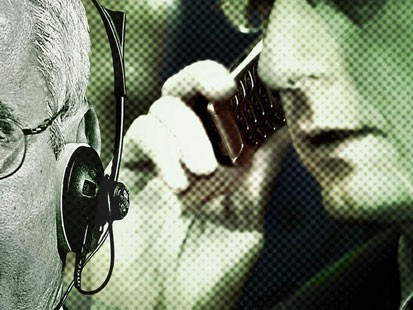Howard Stern swore off free broadcast radio in 2004 in part because of federally mandated decency rules. The self-annointed “king of all media” may have stepped off the throne in doing so. Them’s the breaks in the competitive media marketplace, contorted as it is by government speech controls.
Some would argue that a new king of all media is seeking the mantle of power now that the Obama administration is ensconced and friendly majorities hold the House and Senate. The new pretender is the federal government.
And some would argue that the Free Press “Changing Media Summit” held yesterday here in Washington laid the groundwork for a new federal takeover of media and communications.
That person is not me. But I am concerned by the enthusiasm of many groups in Washington to “improve” media (by their reckoning) with government intervention.
Free Press issued a report yesterday entitled Dismantling Digital Deregulation. Even the title is a lot to swallow – Have communications and media been deregulated in any meaningful sense? (The title itself prioritizes alliteration over logic – evidence of what may come within.)
Opening the conference, Josh Silver, executive director of Free Press harkened to Thomas Jefferson – well and good – but public subsidies for printers and a government-run postal system model his hopes for U.S. government policies to come.
It’s helpful to note what policies found their way into Jefferson’s constitution as absolutes and what were merely permissive. The absolute is found in Amendment I: “Congress shall make no law . . . abridging the freedom of speech, or of the press . . . .”
Among the permissive is the Article I power “to establish Post Offices and post Roads.” There’s no mandate to do it and the scope and extent of any law is subject to Congress’ discretion, just like the power to create patents and copyrights which immediately follows.
I won’t label Free Press and all their efforts a collectivist plot and dismiss it as such – there are some issues on which we probably have common cause – but a crisper expression of “dismantling deregulation” is “re-regulation.”
It’s a very friendly environment for a government takeover of modern-day printing presses: Internet service providers, cable companies, phone companies, broadcasters, and so on.

 Google recently experienced
Google recently experienced  Here’s a very cool little app from Identity Analytics:
Here’s a very cool little app from Identity Analytics: 
 The Technology Liberation Front is the tech policy blog dedicated to keeping politicians' hands off the 'net and everything else related to technology.
The Technology Liberation Front is the tech policy blog dedicated to keeping politicians' hands off the 'net and everything else related to technology.
Reply Comments in FCC’s “Child Safe Viewing Act” Notice of Inquiry
by Adam Thierer on May 20, 2009 · 17 comments
As I mentioned in a post last month, dozens of comments were filed with the Federal Communications Commission (FCC) as part of the agency’s “Child Safe Viewing Act” Notice of Inquiry. Again, this proceeding was required under the “Child Safe Viewing Act of 2007,” which Congress passed last year and President Bush signed last December. The goal of the bill and the FCC’s proceeding (MB 09-26) is to study “advanced blocking technologies” that “may be appropriate across a wide variety of distribution platforms, including wired, wireless, and Internet platforms.” I filed 150+ pages worth of comments in this matter, and here’s my analysis of why this bill and the FCC’s proceeding are worth monitoring closely.
Anyway, this week saw many of the same groups that filed before (and some new ones) file reply comments about those earlier submissions. To make things simple, I have collected most of the notable reply comments down below in case anyone is interested.
Continue reading →